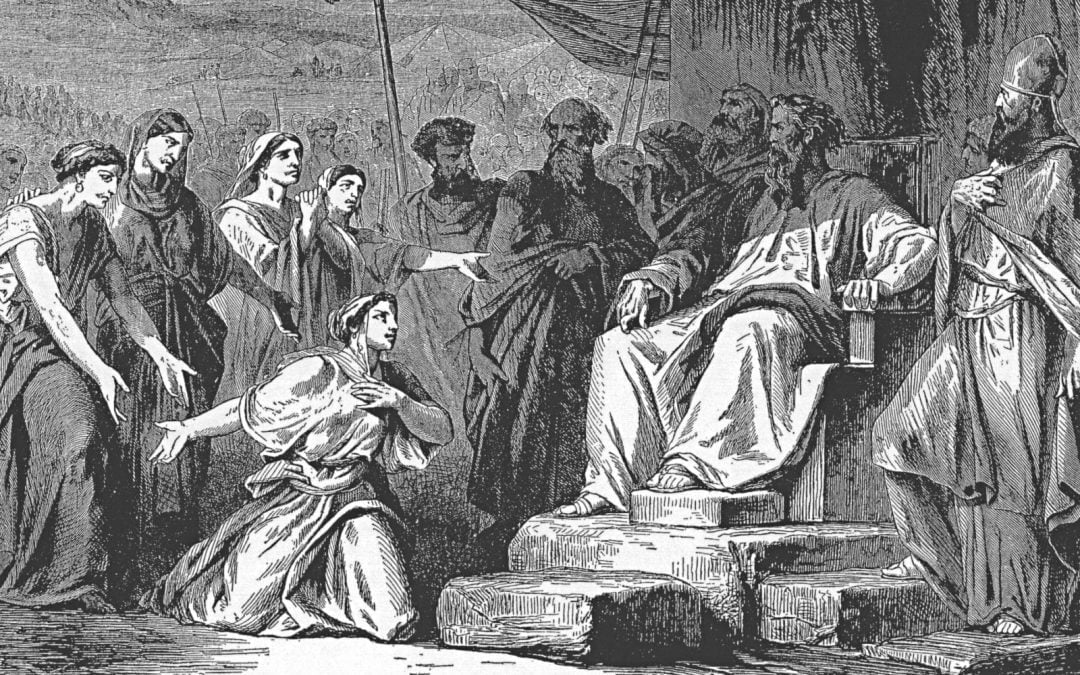The daughters of Zelophehad offer an example of how to challenge unjust laws through creative rebellion.
Here is their story for those unfamiliar with the narrative found in Numbers 27:1-8.
The women stepped up to the entrance of the tent of meeting.
Moses, Eleazar the priest, the council and the congregation all stared back at them, wondering what these five young women were doing standing here, so clearly out of place.
They should not be here, approaching the men in power. After an awkward silence, one of the daughters spoke up, her voice shaking. “Our father, Zelophehad, died in the wilderness.”
A second daughter spoke with a little bit of newfound courage. “Give us our father’s inheritance.”
She didn’t ask, she told, but even if she had asked, that was a shocking statement.
It might not seem as shocking in our modern context, but we know that no woman in any of their history had ever been given inheritance.
The council took a metaphorical step back and muttered, “What authority do these women think they have to come in here and challenge the God-given laws?”
God had given the law that inheritance goes father to son; what authority do these daughters have to get a plot of the promised land?
After some time, a third daughter spoke. “Why should our father’s name die out from his clan just because he had no sons?”
After a pause, another daughter repeated. “Give us our father’s inheritance.”
The council continued to mutter, trying to figure out where they should stand. It eventually got quiet, and everyone looked to Moses for a ruling from God.
The daughters knew they had just made an unheard-of request, and most everyone in the council was sure they were about to be brushed off and sent away.
“The plea of the daughters is just,” Moses declared. “Give them their father’s plot of the promised land.”
“Tell all of Israel,” he continued. “If a man dies without any sons, give his daughters the inheritance.”
The God-given law was changed because five daughters walked into somewhere they weren’t invited, welcome or really allowed, and spoke up.
I imagine if the daughters had argued for their equality in the matters of inheritance, they would have been immediately dismissed.
They shrewdly argued for the honor of their father – that their father’s name must be preserved within his clan – to obtain the inheritance.
Although not generally recorded, I’m sure there were other women that believed they deserved more rights than they were given. Maybe even a few tried to start a conversation but were immediately dismissed.
These five young women stepped up and boldly opposed something that was given by God and was not to be questioned.
They rejected the assertion that “this was commanded by God so don’t question just follow,” which is similar to the parenting phrase, “Because I said so.”
While I’m not going to argue that kids shouldn’t obey their parents, the why behind an instruction is more important than we realize.
Many times, we question the instructions or lack thereof we’re given. I would argue this is a very necessary thing.
When we follow what we’ve been told is our path or God’s plan or when we follow a seemingly face value command from God, we are not only often times led down the wrong path, but also it becomes very easy to maintain a surface level faith.
So, we should invite doubt because it helps us grow not just toward answers and understanding, but also toward faith in our unknowing.
Doubt of a structure is often vocalized as disrespect and distrust of those in leadership.
So, sometimes we take a step back from not only what we think our opinion should be, but also from stances on an issue in general.
The majority of the time when conflict is present, everyone can agree there’s an issue, it’s just a matter of what that issue is.
In the story of the five daughters of Zelophehad, the women saw their lack of means to survive and the council saw women disrespecting the law.
In such circumstances, instead of looking for a direct solution to a problem at hand, we should look for paths that would cause an issue to change or evolve. Many times, it’s a dramatic change that’s needed to force a shift in viewpoints.
One such example is what Antanas Mockus did in 1995 after becoming mayor of Bogota, Colombia – a city riddled with violence, police corruption and lack of community engagement.
Mockus conducted an investigation in which he fired many corrupt cops but offered to retrain and rehire them as mimes.
He placed 420 mimes around the city on busy street corners and had them follow and mimic jaywalkers or point and laugh at those who ran red lights. The city’s traffic fatality rate was cut in half.
To address community engagement, Mockus walked the streets in spandex and a cape calling himself “super citizen” and demonstrated how to pick up trash or generally be a better neighbor.
It was brought to Mockus’ attention that most women were afraid to go out at night. So, he created a Night for Women, asking men to stay home and care for children while women went out.
The city had a water shortage, so he showered on live television, asking city residents to turn off the water while they soap.
In two months, water usage dropped 14%. After the end of his second term, usage was 40% lower than the beginning of his leadership.
Many people questioned and discredited his abilities because he had no prior political experience. Walking the streets in spandex didn’t improve his credibility, but he persisted.
Mockus used innovative, out-of-the-box problem-solving to create a safer, friendlier city, which was eventually celebrated by the vast majority of Bogota.
A politician showering on television may seem more out of the box than arguing for the honor of your father, and that’s because it is, but that doesn’t discredit the ingenuity along with the boldness of the daughters.
Anything out of the ordinary is bold in the eyes of someone. Many times, boldness is considered rebellion, and, in some sense, it is, but that is far from a bad thing.
When we take out the Sunday School of it all, the life and ministry of Jesus was quite similar – it was not only bold but rebellious. He was a man traveling around preaching love and acceptance of outcasts in every form.
So, when we take a step back and follow where we’re led, perhaps, more often than we realize, that’s to the ministry of rebellion.
Editor’s note: This article is part of an ongoing series focused on engaging emerging faith leaders. Learn more about EthicsDaily.com’s “Emerging Voices” and “U:21” series here. This article is adapted from a sermon Shelton preached at NorthHaven Church in Norman, Oklahoma, on Aug. 11, 2019.


